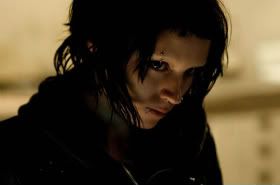 Watching David Fincher’s The Girl with the Dragon Tattoo was like visiting an old friend. A twisted, disturbed, abused, cynical and insane friend who calls you at 4am needing you to bail them out of jail…but a friend nonetheless.
Watching David Fincher’s The Girl with the Dragon Tattoo was like visiting an old friend. A twisted, disturbed, abused, cynical and insane friend who calls you at 4am needing you to bail them out of jail…but a friend nonetheless.
It is difficult, I will admit, to be objective in my review of The Girl with the Dragon Tattoo. I so loved the book and I loved even more the Swedish film, starring Noomi Rapace as the incomparable Lisbeth Salander, the outcast heroine of the Stieg Larsson Millennium trilogy of best-selling books. I knew it would be difficult for any actress to do any better than Rapace does in embodying a character so layered, deep, dark and fascinating, but American actress Rooney Mara certainly gives it her best shot.
Those looking for a faithful interpretation of the book done by a director who certainly is familiar with territory as dark and tortured as this one should be satisfied. Those expecting a run-of-the-mill thriller should be warned that the subject matter here is as intense and violent as you can get and, as ever with a Fincher film, the squeamish need not apply. The book was extremely graphic, and even though the film backs off ever so slightly (probably to avoid an NC-17 rating), it can easily be called a film that’s for adults only.
The Girl with the Dragon Tattoo’s story is basically a simple mystery. A girl went missing forty years ago and the patriarch of the family wants her killer found before he dies. He employs a talented reporter from the big city to come up to his family home in the countryside and investigate. The pool of potential suspects is large, mainly made up of members of his extended, scumbag family—each of whom could easily be the killer. It’s part Misery, part Murder, She Wrote and part Columbo. It truly is nothing more than a genre film, a whodunit with exceptional production values.
But the story is secondary. The real movie lies in the relationship you develop with the two main characters, Mikael Blomkvist, the reporter (played by Daniel Craig) and his investigative assistant, Lisbeth Salander (Mara). Larsson (and screenwriter Steven Zaillian, who adapted Larson’s novel) has created two characters who are sensationally appealing, one an honest, hardworking and smart journalist who was railroaded by a crooked industrialist who feared the reporter would expose him and the other a punk computer hacker with a mysterious past and an equally large chip on her shoulder. Fincher does a great job in thoroughly involving us in their separate stories long before they come together, so by the time they do, we already understand why they click and why we should care. Craig, for his part, gives one of the best performances of his career, not hiding behind big action sequences or special effects to play a character who’s basic, flawed and vulnerable. You certainly can’t escape the James Bond effect, especially when it seems like he’s in trouble (the Bond-like opening title sequence doesn’t help), but Craig does his best to make Blomkvist as down-to-earth as possible, infusing humor and pathos into a character you can’t help but root for.
But it is Lisbeth Salander that you came to see. Just as in the Swedish version of the film, the movie soars when she is onscreen. The character is a cross between a superhero and a wounded puppy. She endures the worst abuse mankind has to offer and comes out, somehow, on top. Nothing she does is boring, nothing ordinary. Which is why it was so hard to watch Mara in the role. She is strong, don’t get me wrong, and she looks the part, but I wish Fincher had allowed her to open up a bit more. Her performance is too robotic and cold for my taste. This is a character defined by her weaknesses and vulnerabilities, it would have been good to let them squeeze through every so often. Instead, Mara plays her as straight-out unreachable, which dulled the performance for me.
Still, her chemistry with Craig is effective and the supporting cast is all first-rate. Christopher Plummer continues his career resurgence as the head of the family who employs Blomkvist to investigate his niece’s disappearance and Robin Wright turns in a nice performance in a small role as Blomkvist’s boss and lover.
It’s hard to say I was disappointed with this film, when it delivers on so many levels, but, in a strange way, I was. Fincher hits all the right notes with the production, the cinematography is great, the acting is first-rate, and the story is nicely paced with nothing vital from the novel left out. Still, I wish a little more humanity could have found its way in. Things have to thaw sometime, even in Sweden.
